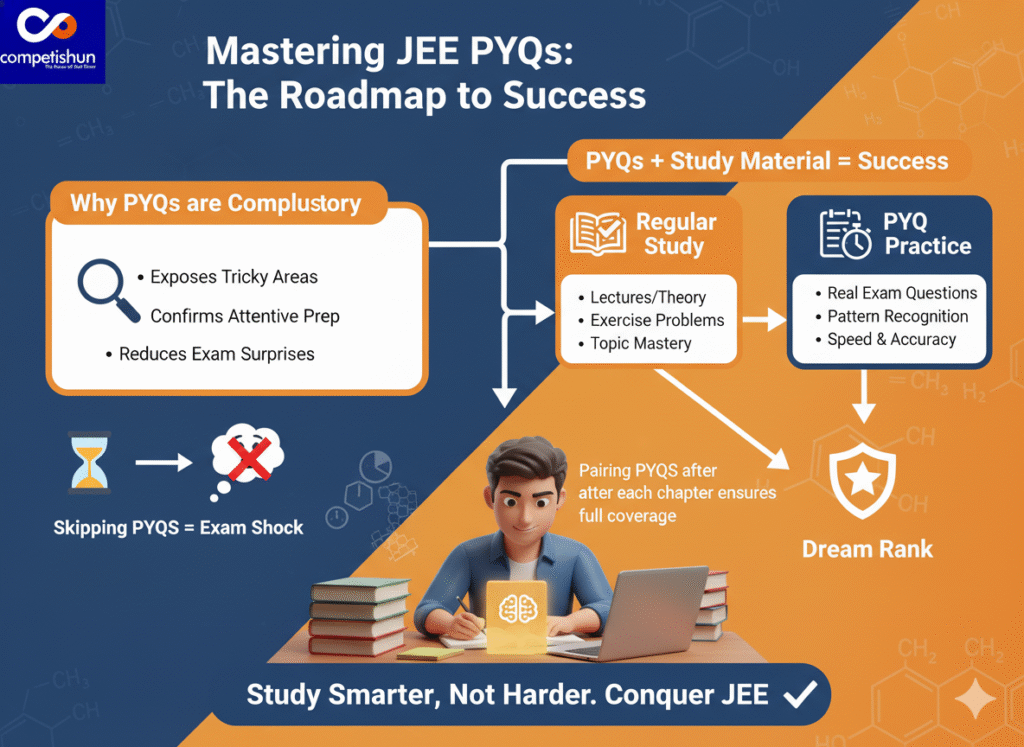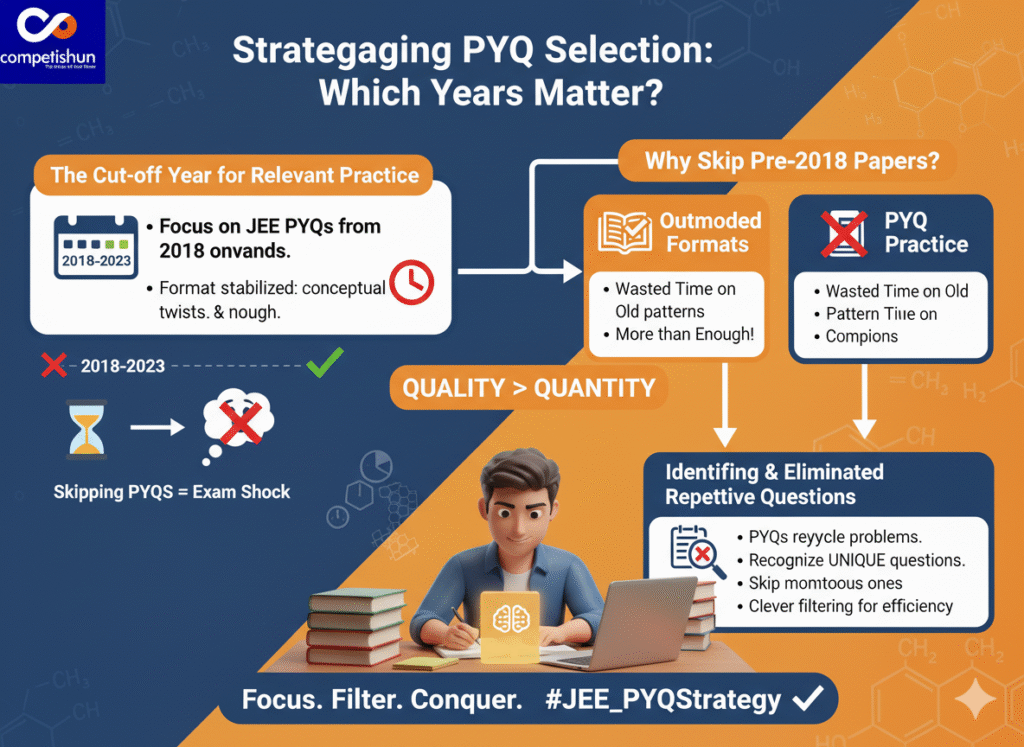Where and how to lead JEE previous year questions (PYQs)?
Why are PYQs a compulsory ingredient?
Imagine you are going through JEE’s previous years’ question papers and wondering if grinding through them will unlock your dream rank. You are not alone. Every JEE aspirant has asked, “If PYQs are really important”? The answer to this is YES! In this guide, we will decode the importance of JEE PYQs and show how to select the right ones, as well as how curated sets can help you study smarter, not harder.

Think PYQs as your roadmap to the JEE frontline. They expose deceptions like tricky units, conversions and subtle formula applications and conceptual dodges. Aspirants who skip the PYQs often find themselves surprised during the real exams. Starting the PYQs confirms the preparation is attentive, poised, and stress-free.
Are PYQs sufficient for 100% in JEE?
The best approach is to pair PYQs with the regular study material. For example, after achieving the exercise on thermodynamics, follow it up with PYQs. This ensures full intangible coverage so that no topic is left behind. In JEE math, physics, and chemistry, this combination…
Strategising PYQ selection: which years matter the most?
The cut-off year for relevant practice
Focus on JEE PYQs from 2018 onwards. That’s when the exam formats stabilised with an attention on notional twists rather than rote-based questions. Solving papers from 2018 to 2023 reflects today’s pattern, keeping your preparation sessions meaningful and up-to-date.
Why should pre-2018 papers be skipped?
Between 2018 to 2023, JEE steered about 105 papers, which is roughly 9000 questions across physics, chemistry and maths. This assemblage is more than enough to master the syllabus without wasting time on older, outmoded formats.

With approximately 100 questions per chapter across all subjects, the 2018-2023 range gives you depth, proximity and relevance to all you need for advanced preparation.
Identifying and eliminating repetitive questions
Many PYQs compile and recycle problems. Solving spares doesn’t add value; it wastes time. Instead, recognise unique concept testing questions and skip the monotonous ones. For example, if questions on similar gravitational concepts, pick the challenging ones. This clever filtering ensures thoroughgoing learning and the tiniest effort.
Introducing curated, high-yield PYQ books
The problem with outdated PYQ Compilations
Most standard PYQ books can be bulky, monotonous and often lack detailed explanations. You flip through hundreds of pages, which is basically a waste of time on replicated books and end up searching for answers on apps and websites. For serious candidates, this approach is neither resourceful nor effective.
The solution: Exclusive, conceptual curations
Curated PYQ books focus on exclusive concept testing problems. Each query is handpicked for its depth, reasonable, and knowledgeable value. Think of it as a filtered goldmine; no repetition, no fluff, only the most valuable questions per concept. These curated sets make sure that aspirants cover each and every chapter thoroughly but without wasting much energy on unnecessary practice.

Efficiency metric: 9000 questions vs 2700 smartly selected
Instead of hard work through 9000 questions, curated sets like Competishun Master PYQ books offer 2700 top-quality questions, 30 per chapter across math, chemistry, and physics. This not only saves but also increases efficiency. You master the same amount of content in half the time, making your prep more prolific and less draining.
Maximising learning from curated practice
Wise organisation for targeted revision
Curated books organise chapter-wise PYQs, so that aspirants can focus on one topic at a time. It can be electromagnetism or organic chemistry. This makes it easier to spot weak areas and strengthen them analytically. Aspirants can also use chapter-wise PYQs for fast revision sessions before mock tests or the final exam.
The guaranteed plan is to attempt the PYQ set without glancing at the answers and check the answers approximately. Lastly, review this log weekly and go back to parallel problems before your next test. These simple habits build accuracy and ensure that aspirants never repeat the same error twice.
Conclusion: The Smart Student’s path to becoming a JEE Genius
PYQs are the spine of JEE preparation, but smart use is what turns fortitude into brilliance. Focus on the year of 2018-2023 question papers, skip repetition, and use curated books like Competishun Master dupees PYQs, which is available on Amazon.
Follow the curated path, stay consistent, and track your errors. You will not just study harder, you will study smarter. The top rank aspiring are visualising is absolutely within reach.

